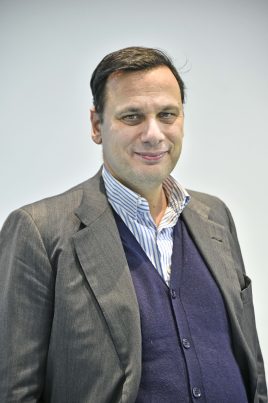ANNIVERSARY
“If society and the Church don’t reach out, even the safest place in the world is not safe at all. The novel ends with a ravaged County. That’s the risk we are running”, said Andrea Monda, editor-in-chief of “L’Osservatore Romano” an expert connoisseur of the works of J.R.R. Tolkien. “The call to holiness is universal, everyone can contribute with his/her own talent to a greater plan. But this requires the contribution of each and every one of us. Ultimately the Company of the Ring wins, not the Dark Lord, alone in his tower”

“A Europe like Middle Earth, fenced off, with barriers along its borders, is bound to collapse. If no one is allowed to enter and nobody wants to leave, annihilation is inevitable. Andrea Monda, editor-in-chief of “L’Osservatore Romano”, is an established Tolkien scholar. Author of three essays dedicated to the work of the British author and acclaimed lecturer, Monda rereads the pages of “The Lord of the Rings” 65 years since the publication of the book. He reveals: “Pope Francis is also fond of Tolkien.”

What remains of the over 1,000 pages written by Tolkien at a time when Europe was devastated by the Second World War?
The struggle for power and for self-affirmation. We are called to include others by creating a Company of diverse people, as in the novel, people who may be hostile within it but who collectively contribute to the success of the mission. Hobbits somewhat resemble western citizenry today: safe, peaceful and serene in a land that has known no war for more than 70 years. But they are also spoiled by widespread well-being. They have stopped living and began dragging themselves into nihilistic sloth.
Are there hobbits who dare challenge societal mores?
Some hobbits have a latent thrust and venture out of the County.
If society and the Church don’t reach out, even the safest place in the world is not safe at all.
The novel ends with the County being ravaged. It’s the risk we’re running. But Tolkien’s prophetic outlook extends even further: hobbits lead a long life, just like contemporary men. The question is: what is the ethical and spiritual cost of this extension of the average age? Is life a passive expectation of the end or is it an adventure?
 Does Tolkien’s work continue to describe the world in which we live today?
Does Tolkien’s work continue to describe the world in which we live today?
Literature is the product of man’s reflections on the mystery of human existence. Chesterton argued that literature can be a luxury, but narrative is a necessity. Man is a narrating being. In the 20th century, a century of crisis in which there seemed to be no more room for great stories, and everything was centred on the inner self, rich works were created from the narrative point of view. When the reader enters the book he leaves the world in which he lives and then returns with a sharper understanding of it, it is an abstraction from the world in order to give it meaning. Whoever reads “The Lord of the Rings” travels through Middle Earth to return to his daily reality with more instruments to understand it.
Are the Hobbits Tolkien’s greatest literary invention?
They are for sure, all the rest – from dragons to talking trees – was already known. They reflect western men of yesterday and today, with their vices and virtues. We can recognize ourselves in these small men caught into challenging events that they manage to overcome by acting together as one.
 Can they be compared to saints or to heroes?
Can they be compared to saints or to heroes?
Hobbits are not heroes in the traditional understanding of the term, although they accomplish great things. They remind us more of saints: not because they are perfect – in fact neither are saints. But because they put themselves at the service of a greater plan. Jesuit theologian Daniélou said that
while the hero demonstrates what man is capable of, the saint demonstrates what God is capable of.
The saint offers his services, whether weak or strong, to respond to the calling. The hobbits are ready, they respond to a mission. They carry out the task they have been assigned. Being faithful to their vocation makes them similar to saints, thereby contributing to the fulfilment of the plan of divine Providence in history.
Is it therefore easier to identify with Frodo than with Gandalf?
The calling for sainthood is universal, everyone can contribute with their talents to a greater plan. But this requires the contribution of each and every one.
Ultimately the winner is the Company of the Ring, not the Dark Lord, alone in his tower.
 As I understand, the hobbits are your favourite characters.
As I understand, the hobbits are your favourite characters.
I am fascinated by the trio Frodo, Sam and Gollum. Gollum in particular is the most tragic and dramatic character in the novel, tormented in many ways. It’s a mini-company that encompasses a traitor, but that is probably the most moving part of the novel, which is also the one we relate to the most. In fact at times we are Frodo or Sam, but we must admit that from time to time we are like Gollum.
Does good always win?
In a letter, Tolkien once wrote he was Roman Catholic, thus the story is a long series of defeats that don’t thwart the final victory. They always fail, even Frodo fails to get rid of the ring, but the story is not made by man. It is made by God. The devil has already lost. Even when it seems that the world is prey to evil, unexpected rays of light appear.
The world will not be saved by the powerful of the earth, but by the small.